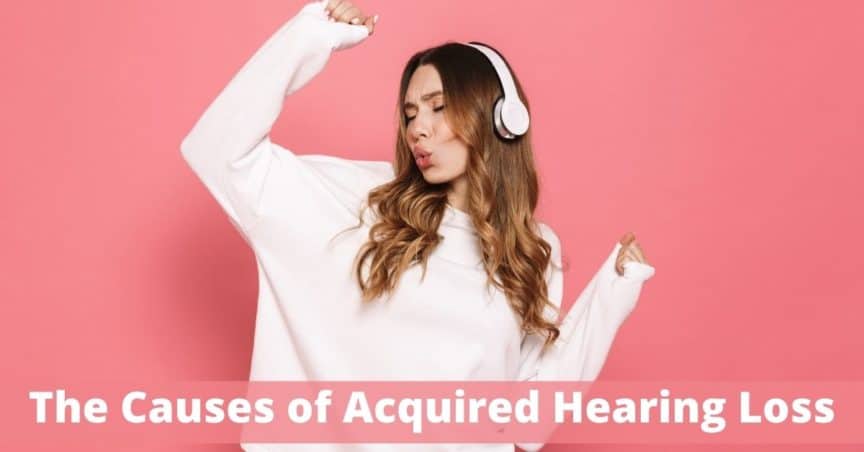- How to Care for Infants With Hearing Loss - April 15, 2024
- Hearing Aid Tips for Runners - April 5, 2024
- Overcoming Misconceptions Around Hearing Aids - March 27, 2024
With 48 million Americans suffering from hearing loss today, it’s important to realize the ways we can acquire hearing loss throughout the course of our lives. Let’s go over some of the important aspects of acquired hearing loss and some of the things we can do to prevent it, or keep it to a minimum and slow down its progress.
Sensorineural vs Conductive Hearing Loss
There are two main types of hearing loss. Sensorineural hearing loss involves problems in the inner ear, auditory nerves and/or the brain. It is defined by problems with transducing (converting) mechanical sound energy into electrical energy, transporting that electrical energy to the brain, and the brain’s ability to interpret it. Common types of sensorineural hearing loss include noise-induced hearing loss (NIHL), age-related hearing loss and chemically induced hearing loss. Most sensorineural hearing loss is incurable and permanent.
Conductive hearing loss includes any type of hearing loss that results from problems in the outer or middle ear. It is defined by problems passing the mechanical energy of sound, picked up by the ear from the environment, along to the inner ear where it is transduced. Conductive hearing loss might result from obstructions in the ear canal, perforations or destruction of the eardrum, problems with the three tiny bones in the middle ear, or the filling of the tympanic cavity with fluid. In many cases conductive hearing loss will heal, or may be treated with surgery.
Ear Infections
One of the most common causes of temporary hearing loss in children, the middle ear infection (otitis media) results when upper respiratory infections travel to the middle ear via the auditory tube. Children’s auditory tubes are more horizontal than those of adults, making them more susceptible to these types of infections. As fluid accumulates in the tympanic cavity, it can impede the movement of the malleus, incus and stapes (the three tiny bones) and cause hearing loss. The hearing loss is almost always temporary, and when the infection subsides, hearing should return to normal. Frequent ear infections may be cause for additional medical interventions.
Swimmer’s ear (otitis externa) can also cause hearing loss by swelling the ear canal shut. In this case also, when the infection subsides hearing should return to normal. Swimmer’s ear is more common in adults and often occurs when water is unable to evacuate the ear canal.
Ototoxic Chemicals
There are over 1,000 medicines, chemicals and herbs that can cause hearing loss. Some people are exposed in the workplace, and some experience hearing loss as an unfortunate cost of a life-saving medical treatment. Many of these chemicals can also induce tinnitus. Depending on the specific chemical cause, hearing may return to normal once exposure has ceased.
Illnesses
Some illnesses can result in hearing loss. They include several common childhood illnesses that can be vaccinated against, such as measles, chicken pox, and mumps. Meningitis, encephalitis and flu can also sometimes cause hearing loss.
Head Injury
Traumatic head injuries can cause hearing loss, along with a host of other problems including memory loss and cognitive difficulty. Sometimes this hearing loss is conductive; the outer and middle ear are near the outside of the head and thus more vulnerable to trauma. These injuries may heal or be surgically corrected.
Traumatic brain injury (TBI) can result from blast impulses or from repeated, minor head traumas like those experienced by American football players. Tiny vibrations, over time, can damage sensitive neurons in the head. A frequent consequence of TBI is “hidden hearing loss,” where a person’s hearing ability shows up as normal on a hearing test, but they have problems hearing out in the real world, where sound is mixed together from a variety of sources. This is a result of damage to the myelin sheaths around the auditory nerves. As electricity passes down the auditory nerve, some of the information “leaks” out. In the clinical environment of a hearing test, they can hear fine. But when more information is sent down the auditory nerve during the course of normal life, not all of it makes its way to the brain and hearing problems can result.
Noise-Induced Hearing Loss
One of the most common causes of permanent hearing loss, NIHL results from exposure to loud sounds. It can be the result of a single, catastrophically loud noise, or it can happen over time from spending a lot of time in environments that are just a little too loud for safety (around 85 dBA). There is no cure for NIHL, but it can be prevented by wearing hearing protection or avoiding noisy environments.
Age-Related Hearing Loss
A type of hearing loss that we will all eventually encounter, age-related hearing loss can begin as early as age 45, but by age 100 nearly everyone has it. There’s evidence that an anti-inflammatory diet can significantly delay the onset and slow the progress of age-related hearing loss.
Treating Hearing Loss
If you have permanent hearing loss, whatever the underlying cause, make an appointment with our team for a hearing test today. Hearing aids are the most common form of treatment for hearing loss, and they are an important part of maintaining hearing and mental health, as well as general well-being. Contact us today to learn more!

